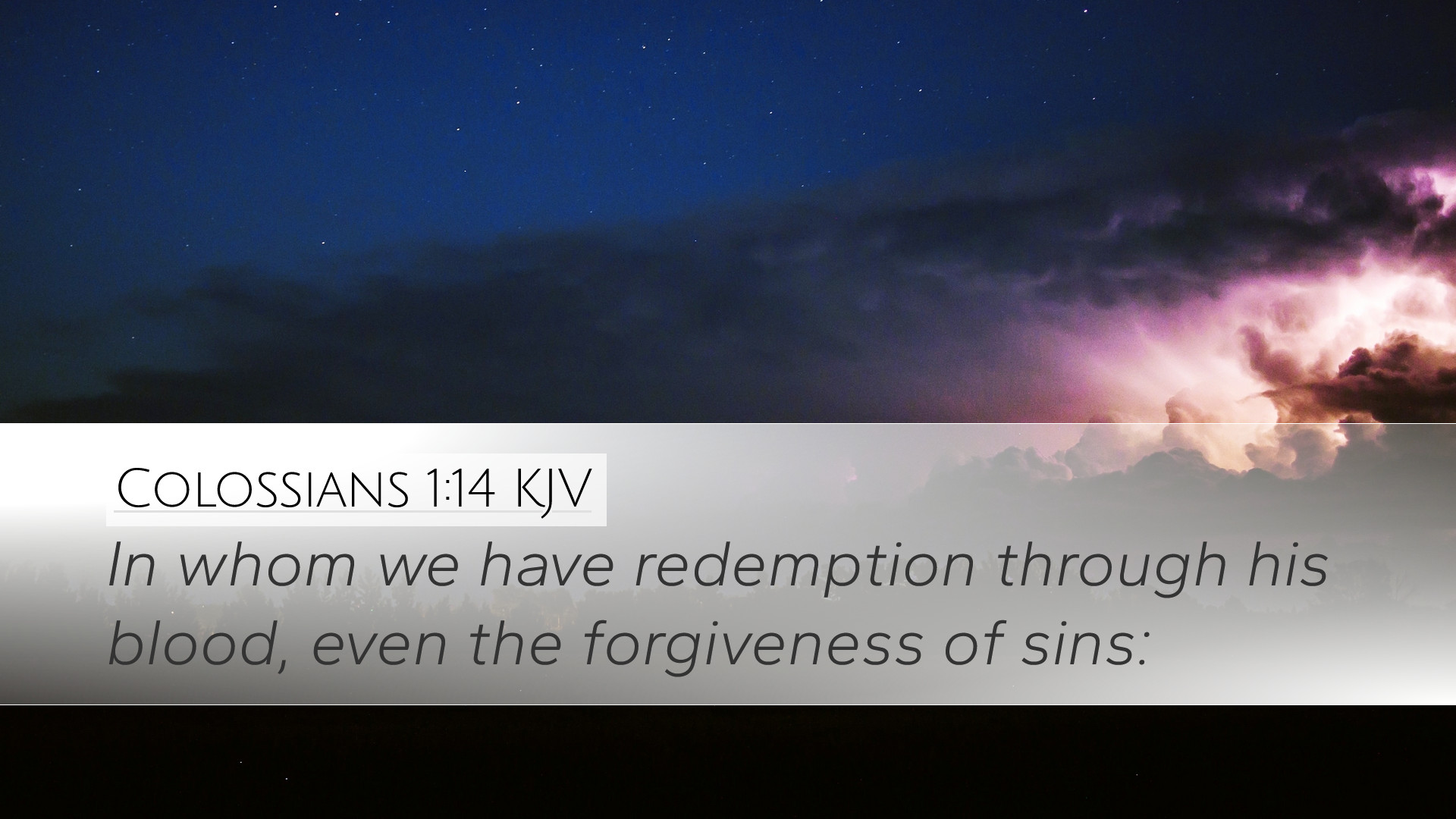Commentary on Colossians 1:14
Verse: "In whom we have redemption through his blood, even the forgiveness of sins:" (Colossians 1:14, KJV)
Introduction
The verse of Colossians 1:14 holds profound significance in the Christian faith, elucidating the themes of redemption and forgiveness central to the Gospel message. The insights derived from classical public domain commentaries provide depth and clarity to our understanding of this passage, emphasizing its spiritual implications for believers.
Redemption Through His Blood
Matthew Henry notes the inextricable link between redemption and the sacrificial blood of Christ. He emphasizes that the term “redemption” signifies being bought back, a theme prevalent in the Old Testament and expressed fully in the New Testament through Christ's atoning sacrifice.
Albert Barnes connects redemption to the notions of liberation and deliverance, stating that this liberation is accomplished through the shedding of Christ's blood. He stresses this point by noting that the value of redemption is intrinsically linked to the blood of Christ, which alone suffices for the multitude of sins.
Adam Clarke further explores the concept of blood as representative of life, where the sacrificial death of Jesus not only redeems sinners but also restores them to a right relationship with God. He articulates that in God’s redemptive plan, the blood of Christ serves as the medium through which forgiveness is granted.
The Nature of Forgiveness
The latter part of the verse, “even the forgiveness of sins,” encapsulates the crux of Christian doctrine regarding sin and redemption. Matthew Henry emphasizes that forgiveness is a divine act, sovereignly granted and intimately tied to the resurrection of Christ, which signifies victory over sin and death.
Albert Barnes highlights that forgiveness is not merely an emotional release but is judicial in nature; it involves God’s righteous decree declaring that one is absolved from guilt. Barnes stresses that this is possible only because of Christ's sacrificial death, which satisfies divine justice.
Adam Clarke adds that the forgiveness mentioned here is complete and total, implying that sins are not only forgiven but forgotten, as per God's promise in Isaiah 43:25. This assurance brings believers hope and encourages them to pursue holiness.
Spiritual Implications for Believers
The implications of this verse for believers are manifold. Firstly, Matthew Henry asserts that recognition of one's redemption leads to a sober realization and gratitude for the grace bestowed upon them, prompting a life of obedience and worship.
Albert Barnes suggests that the understanding of forgiveness transforms a believer’s relationship with sin. The knowledge of being forgiven engenders a motivation to live righteously, fostering a deeper commitment to Christ.
Adam Clarke calls believers to reflect on their status as redeemed individuals, urging them to embrace this identity in their everyday lives and spreading the message of redemption to others as part of the great commission.
The Theological Framework
This verse intricately weaves its concepts into the larger framework of Soteriology, which is the study of salvation. Matthew Henry reiterates that understanding redemption is central to grasping the entirety of God’s salvific purpose, reminding readers that salvation is a comprehensive work of grace.
Albert Barnes situates this verse within Paul’s theological discourse on the preeminence of Christ, highlighting that all aspects of salvation rest on the sufficiency of Christ’s redemptive work.
Adam Clarke emphasizes the expert exclusion of any works-based salvation, insisting that merit lies solely in the blood of Jesus, a theme echoed throughout Scripture.
Conclusion
In summarizing the insights from these esteemed commentators on Colossians 1:14, we recognize that this verse stands as a pillar of Christian belief, encapsulating the essence of redemption through Christ's blood and the profound reality of forgiveness. For pastors, theologians, and students alike, understanding this passage invites a deeper exploration of the nature of sin, redemption, and the transformative power of grace. It ultimately calls believers into a transformative relationship with Christ that empowers them to live out their faith authentically.


